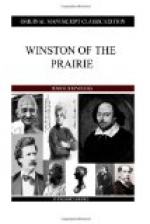Winston nodded. “I used to do so, sir, when I could get nothing better, but after driving oxen for eight years one finds out their disadvantages.”
Barrington’s face grew a trifle stern. “There are times when you tax our patience, Lance,” he said. “Still, there is nothing to be gained by questioning your assertion. What I fail to see, is where your reward for all this will come from, because I am still convinced that the soil will, so to speak, give you back eighty cents for every dollar you put into it. I would, however, like to look at those implements. I have never seen better ones.”
He dismounted and helped his companion down, for Winston made no answer. The farmer was never sure what actuated him, but, save in an occasional fit of irony, he had not attempted by any reference to make his past fall into line with Courthorne’s since he had first been accepted as the latter at Silverdale. He had taken the dead man’s inheritance for a while, but he would stoop no further, and to speak the truth, which he saw was not credited, brought him a grim amusement and also flung a sop to his pride. Presently, however, Miss Barrington turned to him, and there was a kindly gleam in her eyes as she glanced at the splendid horses and widening strip of plowing.
“You have the hope of youth, Lance, to make this venture when all looks black—and it pleases me,” she said. “Sometimes I fancy that men had braver hearts than they have now, when I was young.”
Winston flushed a trifle, and stretching out an arm swept his hand round the horizon. “All that looked dead a very little while ago, and now you can see the creeping greenness in the sod,” he said. “The lean years cannot last forever, and, even if one is beaten again, there is a consolation in knowing that one has made a struggle. Now, I am quite aware that you are fancying a speech of this kind does not come well from me.”
Maud Barrington had seen his gesture, and something in the thought that impelled it, as well as the almost statuesque pose of his thinly-clad figure, appealed to her. Courthorne as farmer, with the damp of clean effort on his forehead and the stain of the good soil that would faithfully repay it on his garments, had very little in common with the profligate and gambler. Vaguely she wondered whether he was not working out his own redemption by every wheat furrow torn from the virgin prairie, and then again the doubt crept in. Could this man have ever found pleasure in the mire?
“You will plow your holding, Lance?” asked the elder lady, who had not answered his last speech yet, but meant to later.
“Yes,” said the man. “All I can. It’s a big venture, and, if it fails, will cripple me, but I seem to feel, apart from any reason I can discern, that wheat is going up again, and I must go through with this plowing. Of course, it does not sound very sensible.”
Miss Barrington looked at him gravely, for there was a curious and steadily-tightening bond between the two. “It depends upon what you mean by sense. Can we reason out all we feel, and is there nothing, intangible but real, behind the impulses which may be sent to us?”




